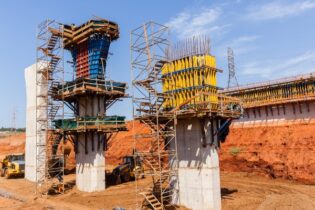Corruption robs the poor of their dignity, Minister of Human Settlements Tokyo Sexwale stated at the recent launch of Klarinet Integrated Housing Project.
The R3,5 billion mixed housing project will produce 12 000 houses over the medium to long term and is a partnership between the National Department of Human Settlements, its provincial counterpart, the Department of Energy, ABSA and the eMalahleni Local Municipality. “My job is to follow the money,” Sexwale told those present. “Please make sure that you report any kind of corruption that takes place because it is the poor whose dignity gets eroded when such activities occur.” Mpumalanga MEC for Human Settlements Siphosezwe Masango appealed to the more than 400 beneficiaries not to sell their houses and then go back and register in the housing queue in the squatter camps, which creates problems for government. The Klarinet Integrated Housing Project will comprise of more than 11 969 housing units that include 5 699 subsidised housing units, 2 322 institutional housing units and 3 948 bonded units. The settlement will also have a clinic, schools and a library, among other facilities. eMalahleni Local Municipality executive mayor Salome Sithole said Witbank was experiencing an economic boom and this was putting pressure on the city’s housing programme as it had to find shelter for the people flocking to the city in search of opportunities. “Our municipality has to start planning for another new city because the construction of the Kusile power station is going to add pressure on our housing and infrastructure development programme,” said Sithole. General manager for ABSA Development Company Luthando Vuthula told the gathering that the bank was committed in partnering with government to contribute in the development of the country. “We don’t intend to deliver just houses. We want to build schools, clinics and other social amenities to create sustainable human settlements,” explained Vuthula. Sexwale previously stated that the primary aim of his department is to deracialise South African urban areas and create new ones. This was said at the Leadership Development Programme, which is offered by the University of Cape for the executive mayors and municipal managers of the country’s metropolitan municipalities. “That is what we are doing here, it’s a huge rectification of what we call the correction of the apartheid spatial development waste,” he told the local government leadership. President Jacob Zuma’s announcement of a massive infrastructure programme, announced during the State of the Nation Address, provides an opportunity to build new towns and cities that will not have townships, but rather integrated and sustainable human settlements. Sexwale said it did not make sense to recognise the Western Cape area of Franschhoek with 3 000 houses as a town, while Cornubia in KwaZulu-Natal, with over 50 000 houses, was not. The country’s massive infrastructure project is breaking new ground, especially in the mineral belt of Limpopo where massive investments are to be seen in roads, railway, telecommunications and massive electrification programme.
“That is going to bring a new impetus to the economy and new cities are going to come up. The first one we identified is Lephalale. It’s a new city and it’s going to be a city without a township,” said Sexwale.
“Our leadership has to have basic skills in management, how projects come about and budgeting. It’s all about costs accounting. People have got to learn some basics and acquire skills on cost accounting, cost control, cost containment and cost reduction,” said Sexwale. Sexwale also believes the provision of medium- to high-density housing projects is one of the main solutions in dealing with the management of spatial integration in urban areas.
At the launch of the Southernwood Square Social Housing project in East London he stated that: “For us to make a difference in the lives of people who fall within the GAP market (those who earn too much to qualify for free government subsidy, but also earn too little to apply for housing finance from banks) we need to have more of these projects.” The project is spearheaded by the Department of Human Settlements and is managed by one of its housing entities, the Social Housing Regulatory Authority (SHRA), and is partly funded by the National Housing Finance Corporation (NHFC).
“Our mandate is to approve spaces with dignity where people can feel safe and thrive. We are afforded this function through an annual capital grant that we receive from the Minister of Human Settlements,” said SHRA chairperson Zhora Ibrahim. This was echoed by Samson Moraba, the CEO of the NHFC.
“Affordability is key in these establishments; our mandate is to ensure that we fund the best possible projects that will allow people to live in areas where they can be productive. We are under the watchful eye of the minister to deliver more projects of this nature.” Sexwale also touched on the State of the Nation Address in reference to Mzukisi Mali, a resident of Grahamstown and a public servant, who was looking for a home. “There are many Mali’s in our midst that feel left out because they earn too little for a bank mortgage loan and too much to get a government-subsidised house. We are saying to them that projects like these are for you. We want you to know you deserve homes just like the rest of South Africans,” said Sexwale. During the launch, some residents demonstrated their dissatisfaction on what they called structural defects of some units. Sexwale addressed this group explaining that they had a right to voice their dissatisfaction. “Clients must be satisfied. That is why we are here, to listen and find out how they feel about this development. You must also highlight the positives, you must tell us about the good things that are happening here as well.” Sexwale also encouraged tenants to pay rent for their units.
“Things don’t come for free. People must keep paying rent. Government has a responsibility to provide human settlements as much as tenants have a responsibility to pay rent,” he said. Southernwood Square consists of 57 bachelor flats, 78 one-bedroom flats and 114 two-bedroom flats. The project caters for households earning between R2 500 to R7 500 per month. During construction, 140 jobs were created and 90 of these were from the local community.






